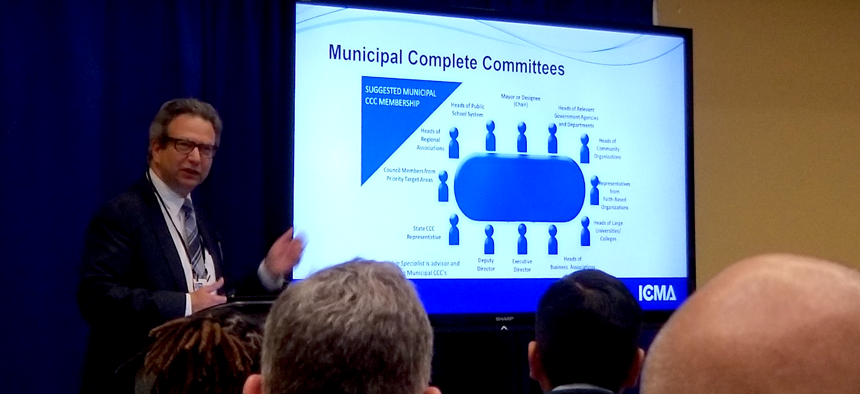Census Bureau Has a ‘Homework Assignment’ for Cities and Counties

Philip Lutz, a regional census manager for the U.S. Census Bureau, discusses the 2020 Census at the International City / County Management Association annual conference. Michael Grass / Route Fifty
Has your local jurisdiction launched a Complete Count Committee?
BALTIMORE — The 2020 Census may be two years away but the federal agency that manages the constitutionally-mandated decennial population count is in preparation mode. And while city and county governments aren’t officially responsible for the count, they do have an important role to play in helping the U.S. Census Bureau.
“We need you to make sure [that everyone knows] how important the census is to residents,” Philip Lutz, a Philadelphia-based assistant regional census manager, told a packed convention center hall on Monday at the International City / County Management Association’s annual conference, which started this weekend in Baltimore.
Lutz noted a reality that the Census Bureau faces: some people will view federal efforts to stress the importance of responding to questionnaires with suspicion. But cities and counties are often better at communicating why the census is vital to local residents.
“Who is the right messenger in your community? That is your homework assignment,” Lutz said while discussing Complete Count Committees.
CCCs are local cross-sector stakeholder groups—often chaired by a mayor or county leader—that have a mission to ensure that the importance of the census is effectively communicated to as many local residents and organizations as possible.
Cities and counties have a lot at stake with the census. Beyond the official count, data compiled by the Census Bureau helps determine federal funding formulas for state and local jurisdictions plus the number of U.S. House seats a state has in Congress. The census is the “foundation of representative democracy,” Lutz said.
CCCs, according to Census Bureau literature at the conference, “utilize local knowledge, influence and resources to educate communities and promote the census through locally based, targeted outreach efforts. They also “provide a vehicle for coordinating and nurturing cooperative efforts between tribal, state and local governments; communities; and the Census Bureau.”
Since every locality is different, communication and outreach need to be specifically tailored to each community, something that cities and counties—and not the feds—are better equipped to facilitate. Lutz asked: “What is the message that will motivate your residents to participate in the census. … And who is the best messenger?”
Among the outreach ideas that communities can use: holding CCC kickoff meetings and media briefings; hosting interfaith breakfasts and weekend events; incorporating census information in newsletters, social media posts, podcasts, mailings and websites; and helping recruit census workers when positions become available.
Lutz highlighted past successes of using local barbershops and beauty salons as venues to promote the census.
Jonathan Lewis, the county administrator in Sarasota County, Florida, told the crowd that “we’re trying to facilitate and get in front of this.” Moreover, “[a]s public administrators, we need to take the lead when others don’t.”
But there are challenges ahead of the 2020 count with the current frayed state of national politics and caustic rhetoric when it comes to immigration.
In a presentation during Monday’s session, Dion Miller, the city manager in Tulia, Texas, highlighted a quote from State Demographer Lloyd Potter that appeared in the Texas Tribune: “You have both recent immigrants and then people who are unauthorized who are going to be wary of anyone who is knocking on their doors and asking questions.”
Texas is faces a big risk of census undercounting, Miller said. Most Texans live in census tracts that exceed the national average for low response rates. Overall, 66 percent of Texas residents and 85 percent of Hispanics in the Lone Star State live in hard-to-count census tracts.
The Trump administration’s controversial plans to ask census respondents whether they are U.S. citizens is currently being litigated in federal court. On Friday, a judge ordered Commerce Secretary Wilbur Ross, whose department oversees the Census Bureau, to sit for a deposition on the matter.
If that question ends up on the 2020 Census, many state and local officials fear that will lead to low response rates in some communities and extensive undercounting.
“We need to count everyone—not just citizens, but persons,” Miller said.
Michael Grass is Executive Editor of Government Executive’s Route Fifty and is based in Seattle.
NEXT STORY: Predicting Obesity From a City's Infrastructure






